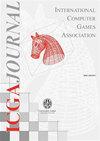GOLOIS赢得幻影围棋锦标赛
IF 0.2
4区 计算机科学
Q4 COMPUTER SCIENCE, SOFTWARE ENGINEERING
引用次数: 2
摘要
《幻影围棋》是一款双人游戏,通常是普通围棋玩家的娱乐游戏。这相当于象棋中的Kriegspiel。幻影围棋是经典围棋的一种变体,玩家看不到对手的走法。两个玩家各自有自己的棋盘,在棋盘上只能看到他们自己的棋子。需要一个裁判。他有一个用来维持游戏实际状态的参考板。球员们向裁判传达他们的移动决定。幻影围棋的规则有一些变化,在比赛中使用的规则中,裁判对建议的走法有以下回复:本文章由计算机程序翻译,如有差异,请以英文原文为准。
GOLOIS wins Phantom-Go Tournament
Phantom Go is a two-player game often played as an entertaining variation by regular Go players. It is the equivalent of Kriegspiel for Chess. Phantom Go is a variant of classic Go in which the players do not see the opponent’s moves. Two players each have their own board, on which only their own stones are visible. A referee is needed. He has a reference board on which the actual state of the game is maintained. The players communicate their move decisions to the referee. There are a few variations to the rules of Phantom Go, in the rules used for the tournament, the referee has the following replies to a suggested move:
求助全文
通过发布文献求助,成功后即可免费获取论文全文。
去求助
来源期刊

Icga Journal
工程技术-计算机:软件工程
自引率
25.00%
发文量
16
期刊介绍:
The ICGA Journal provides an international forum for computer games researchers presenting new results on ongoing work. The editors invite contributors to submit papers on all aspects of research related to computers and games. Relevant topics include, but are not limited to:
(1) the current state of game-playing programs for classic and modern board and card games
(2) the current state of virtual, casual and video games
(3) new theoretical developments in game-related research, and
(4) general scientific contributions produced by the study of games.
Also welcome is research on topics such as:
(5) social aspects of computer games
(6) cognitive research of how humans play games
(7) capture and analysis of game data, and
(8) issues related to networked games are invited to submit their contributions.
 求助内容:
求助内容: 应助结果提醒方式:
应助结果提醒方式:


